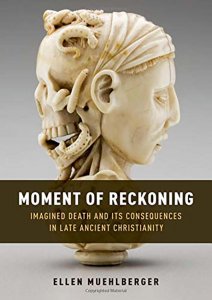Presented By: Institute for the Humanities
Author's Forum Presents: "Moment of Reckoning: Imagined Death and Its Consequences in Late Ancient Christianity"
A Conversation with Ellen Muehlberger and Deborah Dash Moore

Ellen Muehlberger (history, classical studies, Middle East studies) and Deborah Dash Moore (Judaic studies, history) discuss Muehlberger's latest book, followed by Q & A.
Late antiquity saw a proliferation of Christian texts dwelling on the emotions and physical sensations of dying—not as a heroic martyr in a public square or a judge’s court but as an individual, at home in a bed or in a private room. In sermons, letters, and ascetic traditions, late ancient Christians imagined the last minutes of life and the events that followed death in elaborate detail. This book traces how, in late ancient Christianity, death came to be thought of as a moment of reckoning: a physical ordeal whose pain is followed by an immediate judgment of one’s actions by angels and demons and, after that, fitting punishment. This emphasis on the experience of death ushered in a new ethical sensibility among Christians, in which one’s death was to be imagined frequently and anticipated in detail. This was initially meant as a tool for individuals: preachers counted on the fact that becoming aware of a judgment arriving at the end of one’s life tends to sharpen one’s scruples. But, as this book argues, the change in Christian sensibility toward death did not just affect individuals. Death imagined as the moment of reckoning created a fund of images and ideas within late ancient Christian culture about just what constituted a human being and how variances in human morality should be treated. This had significant effects on the Christian adoption of power in late antiquity, especially in the case of power’s heaviest baggage: the capacity to authorize violence against others.
Late antiquity saw a proliferation of Christian texts dwelling on the emotions and physical sensations of dying—not as a heroic martyr in a public square or a judge’s court but as an individual, at home in a bed or in a private room. In sermons, letters, and ascetic traditions, late ancient Christians imagined the last minutes of life and the events that followed death in elaborate detail. This book traces how, in late ancient Christianity, death came to be thought of as a moment of reckoning: a physical ordeal whose pain is followed by an immediate judgment of one’s actions by angels and demons and, after that, fitting punishment. This emphasis on the experience of death ushered in a new ethical sensibility among Christians, in which one’s death was to be imagined frequently and anticipated in detail. This was initially meant as a tool for individuals: preachers counted on the fact that becoming aware of a judgment arriving at the end of one’s life tends to sharpen one’s scruples. But, as this book argues, the change in Christian sensibility toward death did not just affect individuals. Death imagined as the moment of reckoning created a fund of images and ideas within late ancient Christian culture about just what constituted a human being and how variances in human morality should be treated. This had significant effects on the Christian adoption of power in late antiquity, especially in the case of power’s heaviest baggage: the capacity to authorize violence against others.